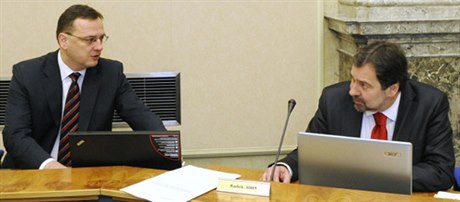Does Prime Minister Petr Nečas (Civic Democrats, ODS) really intend to intervene in the scandals relating to Supreme Audit Office (NKÚ) chairman František Dohnal, who has repeatedly refused to deliver to the members of the parliamentary audit committee the documents necessary for the audit of the financial management of the NKÚ? Or is he all (slick) talk and no (decisive) action?
As Czech Position reported last month, Dohnal will most likely prolong the current leasehold deed at the Tokovo building in Prague-Holešovice — which will mean a real victory for its owner, the PPF group, but not for the state budget. Last year, Dohnal refused to allow let a parliamentary commission exmaine the NKÚ’s finances and was fined Kč 50,000 for barring MPs access to the books. Furthermore, Dohnal himself is accused of improperly making use of two luxury apartments — this breach-of-trust matter is currently in court— and three luxury cars at taxpayers’ expense.
Nečas’ government has declared the fight against both corruption and the wasteful use of state funds to be among its top priorities: What has he to say about the fact that Dohnal has not allowed the MPs to check whether the NKÚ manages state finances effectively?
Does Nečas not mind the fact that a state institution resides at a building whose owner is the PPF group but the official proprietor is Office Star Three, which is owned by a Cyprus-based company? Isn’t it time to set to work on changing the law so as to reduce the operational scope of powers of the NKÚ chief, who, when it comes to the office’s financial management, is an absolute ruler?
Government spokesman Jan Osúch reacted quickly to Czech Position’s questions on the matter, but rather than provide direct answers gave a circumspect political statement. “It is a fact that fighting against corruption and the endeavor to put a stop to the wasteful use of tax payers’ money is one of the key priorities of Petr Nečas’s coalition cabinet,” Osúch wrote, adding that proof of this is the recently adopted anti-corruption strategy, and other changes currently under preparation.
As regards the NKÚ itself, Nečas is allegedly convinced that the office’s faultless work can significantly facilitate the disclosure of corruption.
“The Prime Minister has taken note of the criticism of and ambiguities surrounding the financial management of the Supreme Audit Office over the long term,” Osúch continued. “With respect to the fact that by law the main supervisory body of this office is the Audit Committee of the Chamber of Deputies of the Parliament of the Czech Republic, this committee also has the greatest amount of information about what has been going on in the NKÚ. The Prime Minister will more closely acquaint himself with the findings of their auditing work and subsequently take a stand.”
Coalition tug-of-war given preference
So, why has Nečas not yet acquainted himself with what is going on in the NKÚ? And when exactly will he do so? The affairs connected with NKÚ head Dohnal are old news. Reprehensions on the part of the NKÚ board were published in the spring of 2009. Nečas is behaving in exactly the same way as the MPs: with no undue haste. The MPs also object to many things, and discuss the problem in the lobbies, yet — as they themselves say — there are no specific plans for a solution on the table.
Nečas will thoroughly read through the materials after the leasehold deed will have been long signed and a court will deal with another legal action initiated by MPs since Dohnal has not delivered the required documents to them.
The NKÚ is not an obscure state institution. It supervises the management of state property and has an annual budget exceeding half a billion crowns. Evidently, the problems relating to the NKÚ are not a priority either for Nečas or his government. Not surprising really, considering that he spends so much time with a virtually everyday tug-of-war with Interior Minister Radek John (Public Affairs, VV).
Why then not just abolish the NKÚ? The results of the audits carried out have often been overlooked, the media have repeatedly analysed František Dohnal’s scandals, which decreases the office’s credibility. Moreover, everyone who the NKÚ is after can protest against the investigation’s possible critical outcome. After all, it is not the right institution to point out the faults of others!





